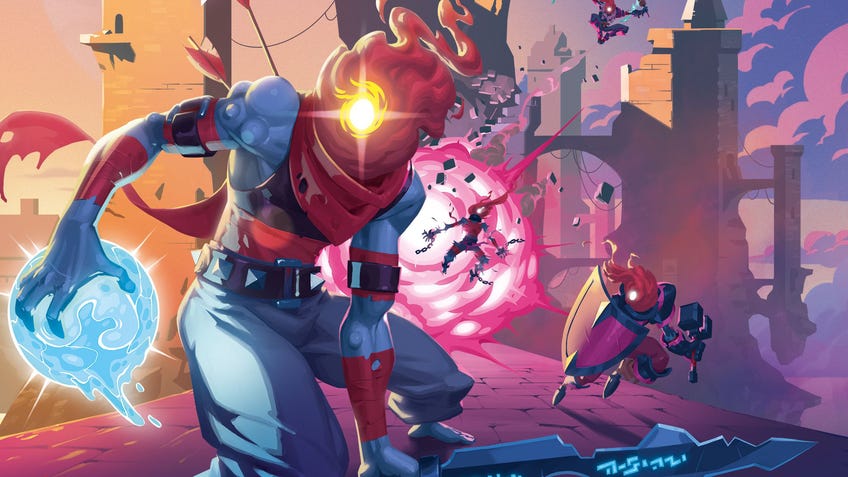What are you playing this weekend? Here’s what we’ve been playing!
Playing games Till the Last Gasp.
With the weekend almost here, it’s time to discuss what the Dicebreaker team have been playing this week! This article is one in a series that provides readers with insight into what we’ve been playing, so that you can be inspired to go off and play some tabletop games yourself.
This week’s entry features Matt talking about his impressions of the upcoming board game adaptation of Dead Cells, a rogue-lite video game, myself sharing my thoughts on improve board game/RPG Till the Last Gasp, Wheels providing his latest updates on Magic: The Gathering’s Commander format and Maddie chatting about her experiences playing the tabletop roleplaying game Pathfinder: Second Edition.
If any of these discussions spark your interest, please do let us know in the comments below or on Twitter @joindicebreaker. Alternatively, if you’ve been playing anything you have thoughts about, or have plans to play a tabletop game this weekend, feel free to share them exactly the same way. Happy gaming!
What We’ve Been Playing - May 19th 2023
Dead Cells: The Rogue-Lite Board Game
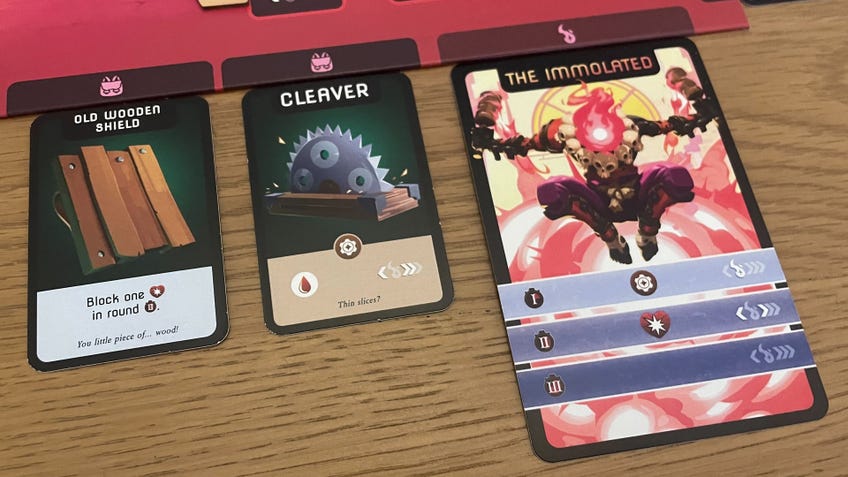
Thanks to a prototype sent over by publisher Scorpion Masque ahead of its Kickstarter campaign, I’ve been giving the Dead Cells board game an early go.
I’ll admit: despite being a huge fan of roguelikes, Dead Cells (the video game) struggled to sink its claws into me in the same way that Binding of Isaac, Rogue Legacy, Hades and so on did. It looks great, controls well and has a tight loop at its core, but for some reason I never found myself spending hour after hour toughing it out against its brutal enemies and poking down its many mysterious pathways.
If anything, that makes Dead Cells (the board game) even more impressive. Far more than just another dungeon crawler painted in pixel art, Scorpion Masque has turned the video game’s fast-paced combat into a difficult yet pacey card game, embedded in the branching routes and randomised loot of the maps on its various boards.
The party of Beheaded (the prototype doesn’t include the game’s solo mode, which introduces an AI companion) each play a card - or cards, if there’s just two of you - to battle rows of enemies, executing attacks, abilities and other effects based on their timing across three rounds. It’s fast yet devilishly strategic, with the need to carefully plan ahead using your limited powers to take down foes - especially if you’re yet to pick up equipment and other items that add extra combat options.
The simplicity stands in especially stark contrast to the bloated rules of many other video game adaptations (plus there’s only one -1! - miniature in the whole box), and ensures that Dead Cells feels as nimble in paper as it does on screen.
Most impressive, though, is the way that Dead Cells captures the roguelike (or rogue-lite) try-and-try-again cycle of the video game. While each individual run can end in failure on a player’s defeat, causing the party to lose all their collected equipment and progress through a dungeon, the players can also earn permanent unlocks tracked by cards cleverly stored in plastic sleeves on a central board.
This board simply folds away between sessions, allowing each new run to have some continuity and avoid the sense of starting over every time - unlocked runes might grant extra routes, mutations can give you helpful starting bonuses and the players can customise their characters’ decks with new combat abilities.
It makes Dead Cells (the board game) feel highly faithful to Dead Cells (the video game), sitting comfortably between the irreversible evolution of a legacy game (everything in Dead Cells can be easily reset) and the wipe-everything-clean of a conventional one-and-done board game.
I’ve only had a few runs at Dead Cells’ punishing gauntlet so far, but its sharp combat and satisfying roguelike mechanics have me hooked and eager to discover what lies in wait - the board game has finally managed what the video game couldn’t.
Matt
Till the Last Gasp
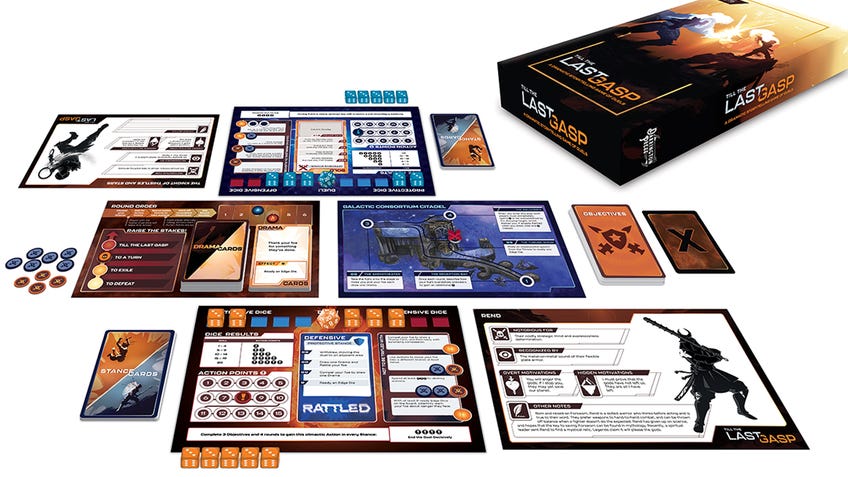
The latest release from Darrington Press, the publisher behind various Critical Role tabletop titles, is an interesting combination of board game and tabletop roleplaying game. Till the Last Gasp is a two-player game that has its competitors going head-to-head against one another as characters who have some beef to sort through, for one reason or another. During the game, players will be using a mixture of strategy and improv to narrate the course of their epic duel, with the goal not necessarily being to win but to tell a good story.
Before the players embark on their fictitious battle, they will need to create their characters by rolling a d20 and filling in a sheet with the randomly chosen answers. Rather than being ability scores - like in a tabletop RPG like Dungeons & Dragons - the answers players input into their character sheets flesh out the reasons why they seek a duel with their opponent. Having players focus on the background and personalities of their characters, instead of the numbers, ensures that players immediately know that Till the Last Gasp, first and foremost, is a game about acting out scenes in a story of their own design.
Once players have their characters, they then choose from three randomly selected objective cards to work towards during the game. The objectives in Till the Last Gasp are very straightforward - requiring players to perform specific actions up to two times in a game - but provide players with a structure to work their roleplaying within. This structure means that the tabletop roleplaying-esque game avoids feeling too much like a drama class exercise. However, the simplicity of the objectives does mean that the actual gameplay of this tabletop game feels very underwhelming, with player actions feeling driven by the need to tick off boxes and not immerse themselves within a story.
Whenever Till the Last Gasp does focus on enabling players to tell their tale - such as having players describe how their players begin their duel, and the use of drama cards that include prompts for roleplay - it is a fun experience that could offer a nice entry-point into tabletop RPGs that do revolve more around the roleplay side of things. Having already played a fair number of tabletop roleplaying games that facilitate improv and roleplaying, Till the Last Gasp does feel very rudimentary. Nevertheless, it serves as a quick and simple opportunity for improve with specific goals for players to reach, as well as ways for them to craft a little narrative of their own.
Meehan
Magic: The Gathering - Commander
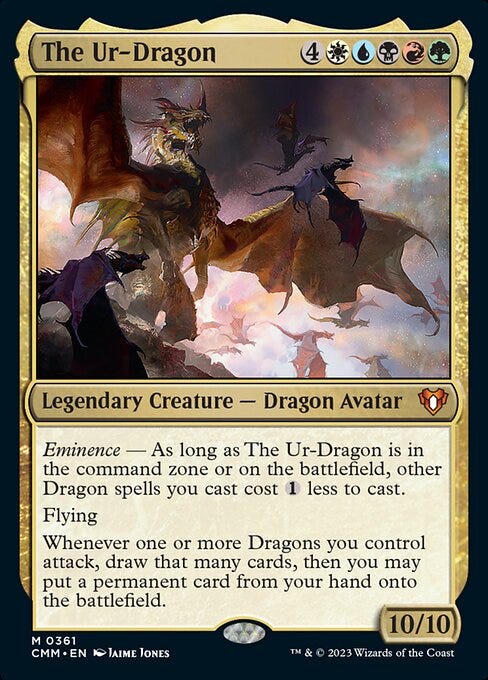
Yes, I know I’m sorry! I talk about it every week but I’m so far down the rabbit hole I’ve forgotten what other tabletop games look like. Recently I’ve been obsessed with Commander variants, different ways to play this new beloved hobby of mine. The great thing about Commander is how thematic and flexible it is, which leads to really cool variations on how to play. You can play Commander as a hidden role game, you can have secret targets that everyone is trying to kill, you can have players turn into vengeful ghosts after they’re knocked out - There's an unending list of stupid ways to mess with the format that I’m desperate to try out.
One of my favourites I’ve seen so far is a mode called Star, in which everyone builds a mono-coloured deck from one of the five colours of Magic; White, Blue, Black, Red, Green. You then all sit in formation with players sitting aside their ally colours, and opposite their enemy colours. To win the game you have to defeat your two philosophical enemies before anyone else does the same. White for example, does not get on with red and black and therefore will want to take them out. They’ll have a tenuous relationship with green and blue as they’re allied colours, but each ally is also allied with one of your enemies! It’s a messy, political affair that sounds right up my ally and I can’t wait to give it a go.
If you’re interested in Commander, then boy do we have a video for you coming up on the Dicebreaker YouTube channel this weekend as I talk about why you should play it, and why it’s the best way to play Magic: The Gathering.
Wheels
Pathfinder: Second Edition
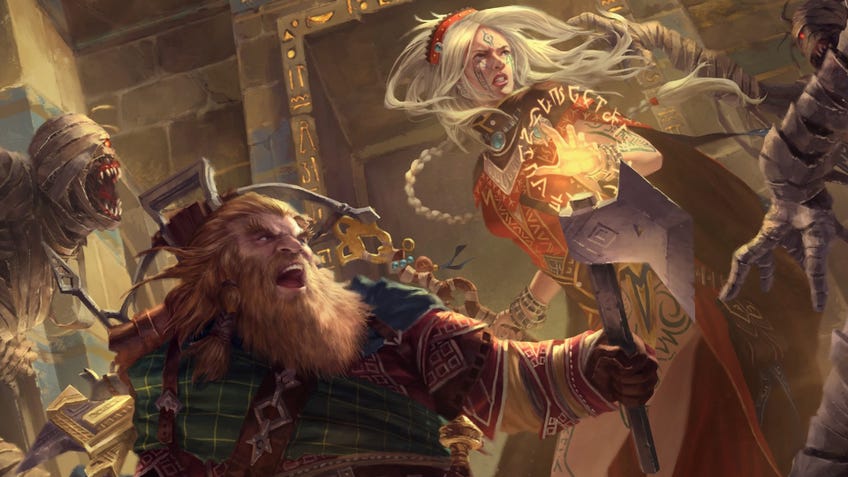
The D&D campaign I regularly played in has come to an end and we decided to switch our fantasy sessions up and move over to Pathfinder. I spent a few weeks going through the new classes and races and found it really exciting to be picking a character where everything felt new, after getting to the point of knowing most of D&D off by heart. I settled on a witch, because of course - a spell-caster with a familiar that, in my case, uses nature magic.
One thing that really stands out for the system is the flexibility, a witch’s spells come from different schools of magic depending on the pact you take. Every aspect of a character is built around selecting feats from races, backgrounds and classes, meaning no two will feel the same. It’s perfect if you like leaning into a narrative typically at odds with a class, or just want to do something different but don’t want to feel punished for it during combat - which is probably the second biggest difference I’ve been loving.
Pathfinder’s combat has a three action system which means you can do anything you like spread over those three moves, and as a spell caster, getting to double up on magic has been amazing. I never feel like I’ve wasted a turn if my Electric Arc doesn't hit as I can throw a Guidance in there later. I’m excited to keep levelling up and picking new feats to expand my character. However, for now it’s kind of nice to be back at level one, discovering a new game, new characters, and all new monsters. I can’t wait to see more of Pathfinder and to level up enough to cast Mad Monkeys.
Maddie
